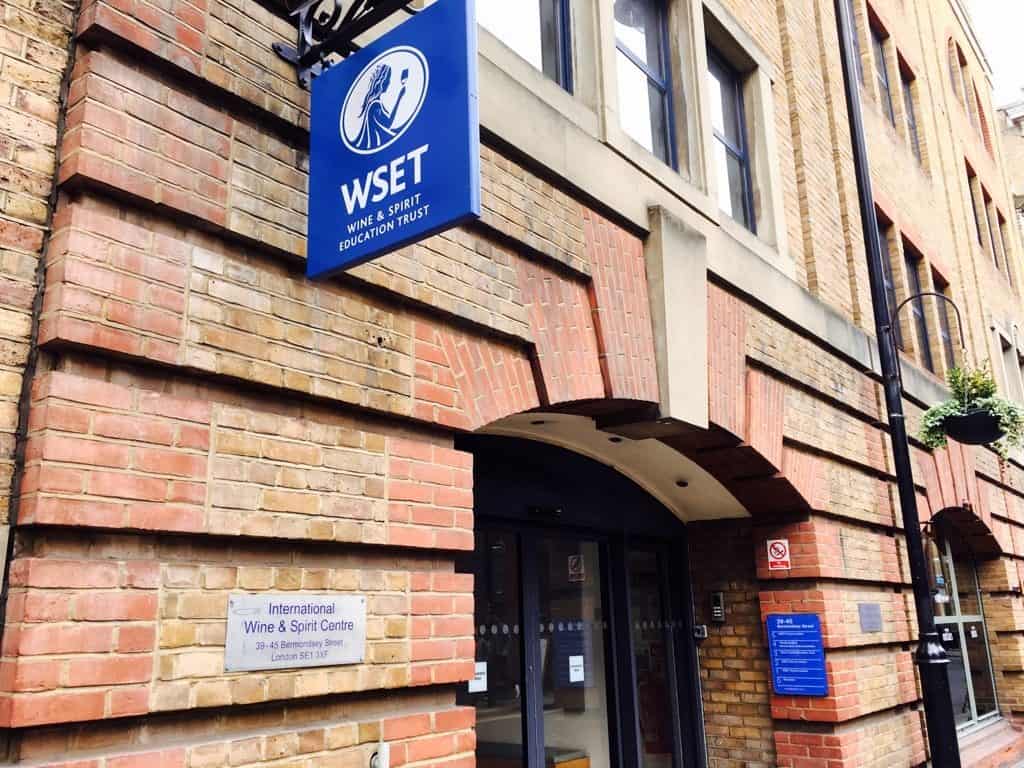



The Wine and Spirit Education Trust (WSET) has been a hallmark institution in sommelier education since its inception in London in 1969. However, as the trust burgeons, franchising its curriculum to individual contractors globally, concerns regarding its pedagogical rigor and legal standing in the U.S. have begun to ferment. Here’s a pour over the courses it offers and the criticisms they face.

At the outset, it offers a structured pathway for wine education through four levels of certification in wines and three each in spirits and sake.
WSET Level1 Award in Wines serves as a stepping stone for novices, offering a foundational knowledge of various wine types, grape varieties, and basic food and wine pairing principles. With a 30-question exam at the finale, successful candidates earn a lapel pin and a WSET certificate.
Level2 Award builds on the basics, delving into grape varietals, wine-making processes, and the introduction to sparkling and fortified wines. A 50-question exam and a blind wine tasting session are the barriers to earning the lapel pin and certificate here.
Level3 Award in Wines, regarded as a professional qualification, deep dives into viticulture, fermentation, and wine distribution, including a rigorous assessment comprising a multiple-choice section, a short written paper, and a blind tasting.
WSET Level4 Diploma in Wines, the zenith of their certifications, spans 18 to 36 months, ingraining expert knowledge in winemaking, wine businesses, and an independent research assignment. Post completion, candidates earn a lapel pin, a certificate, and the honor to use ‘Dip WSET’ in their professional signature.
However, diving into the structure and delivery of these courses uncorks some concerns.
While the WSET classes are comprehensive, critics argue they lack creativity and diversity. The reliance on PowerPoint presentations and a somewhat rigid curriculum may stifle the learning experience, particularly for those seeking a more dynamic, hands-on approach to wine education.
Furthermore, the focus on restaurant professionals leaves other enthusiasts feeling a tad alienated. This narrow focus might be a deterrent for potential students keen on exploring wine outside the professional restaurant milieu.
Pursuing WSET wine certification is not for the faint of wallet. Exam fees for Level 2 and Level 3 Awards in Wines and Spirits hover around $600 and $1000, respectively, while the Level 4 Diploma demands a hefty $7500. These costs cover merely the exams, with classes and wine purchases adding to the tab, potentially fermenting financial stress among aspiring sommeliers.
Wine & Spirit Education Trust’s classification as a private foundation in the United States might be a legal vineyard waiting for a harvest of issues. The claim to provide education and award professional certifications could clash with its private foundation status, possibly inviting IRS scrutiny and impacting the reputation of WSET certified wine schools.
A Merlot or a Shiraz?
Despite its rigorous standards and global recognition, the value of a Wine and Spirit Education Trust certification largely hinges on individual career goals and learning preferences. Institutions like the Court of Master Sommeliers and the National Wine School offer alternatives focusing on restaurant management and experiential learning, providing a different flavor of wine education.
As the program continues to expand its online and global footprint, addressing the creativity chasm, cost concerns, and legal limbo could help the trust age like a fine wine, ensuring its WSET certifications remain a coveted asset in the wine and spirit education vineyard.
The quality of education at affiliated schools can range from exquisite to lackluster. A notable player, Fine Vintage LTD, has established a robust presence in many cities, yet the quality of education can still be a mixed barrel. For a richer educational experience, prospective students might want to consider schools in Napa and NYC. These regions, with their vibrant wine cultures, often host schools with instructors who are seasoned vintners or sommeliers, offering a more engaging learning environment.
Examining the WSET Global Appeal
The Trust’s structured approach finds favor among international students and those without a formal college education. The program’s hierarchical structure, with clear advancement levels, offers a well-laid path for career progression in the wine and spirit industry. The global recognition of their certifications also holds a significant appeal for those looking to ply their trade on the international stage. Yet, this structure could be a double-edged sword, where the rigorous memorization and analysis could potentially stifle the holistic appreciation and understanding of wine.
The Wine & Spirit Education Trust provides a solid framework for serious wine and spirit education. However, as with any educational endeavor, prospective students should weigh the costs, pedagogical approach, and potential return on investment before diving into the world of Wine and Spirit Education Trust certifications. The growing concerns around creativity and legal standing warrant consideration from both the trust and potential enrollees, to ensure that the journey through the vineyards of knowledge is as enriching as a well-aged bottle of Bordeaux.

The programs are well recieved and a LOT of restaurant people have these credentials. What they don’t tell you is that outside of restaurants, its not as important or respected as a wine program. I wish I new that before I started, as I dont really want to be a waiter or a restaurant sommeleir. Did you know there are different types of sommeliers? I didn’t
The programs are just so dated. I’m in my sixities and I find these programs to be outdated. I can’t imagine what someone in their twenties would think of this material.